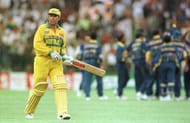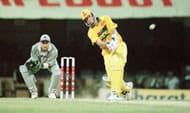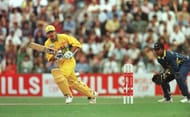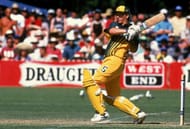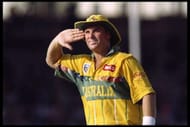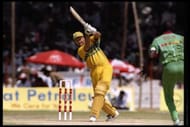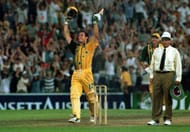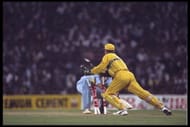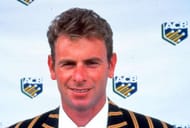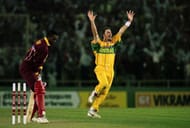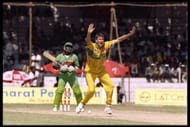Over the past 4 months or so, Australia’s newest entrant into Test cricket, Matt Renshaw has struck all the right chords and looks to become a mainstay in the Australian side, opening the innings along with David Warner.
In the 5 test matches he has played, he has scored 414 runs at an average of 59.14 with two half centuries and one century to his name. He played a useful knock in the first innings of the recently concluded Test against India which Australia won by 333 runs.
Currently the youngest member of the Test side, Renshaw was born shortly after Australia’s loss to Sri Lanka in the 1996 World Cup which was held in the sub-continent.
The Australian side back then had a mixture of youth and experience and most of them went on to become extremely successful and were a part of the “golden era” of Australian cricket as well from 1999-2007.
In this article, we take a look at the Australian side at the time when Matt Renshaw was born, how they fared through their careers, and what they are up to now.
#1 Mark Taylor
One of the most solid Test batsmen, and arguably one of the greatest ever slip fielders, Mark Taylor was the captain of the Australian cricket team around the time when Renshaw was born. He held the record for the most number of catches taken by a non-wicket-keeper until it was broken by Rahul Dravid against New Zealand in 2009.
Taylor featured in 104 Tests for the Kangaroos and amassed 7525 runs at an average of 43.49 with 40 half centuries and 19 centuries to his name.
His performance in the 1996 World Cup was average as he managed 193 runs in 7 matches at an average of 27.57.
After the 1996 World Cup, he was dropped from the ODI side in 1997, and retired from all forms of the game in 1999. He is currently a commentator for Nine Network, and the Director of Cricket Australia as well.
#2 Mark Waugh
One of the most gifted batsmen of all time, Mark Waugh was a delight to watch when he was in full flow. His shot making was elegant, and it was a treat to the eyes as he took on various opposition bowlers with ease.
He was always in the shadow of his twin brother, Steve, but went down as one of Australia’s greats as well. He featured in 128 Tests and 244 ODIs and has a combined average of about 40. He was the second highest run-getter in the 1996 world cup with 484 runs in 7 matches at an average of 80.66 with 3 centuries to his name
Mark retired from international cricket in 2002 after which he continued to play domestic cricket for a couple of years. He is currently a national selector for the Australian cricket team and a commentator for Channel 10. He was seen commentating during the Big Bash League.
#3 Ricky Ponting
Arguably one of the best captains in world cricket ever, and one of the best batsmen to play for Australia, Ricky Ponting was just a youngster back when Renshaw was born. He had made his debut just one year before the 1996 world cup, and due to some impressive performances with the bat, found himself in the playing XI for all the matches in the tournament.
Ponting led Australia to two consecutive world cup wins in 2003 and 2007 and was the captain of the side during the “golden era” of Australian cricket.
He played a total of over 500 matches in both the formats combined and averaged above 50 in Tests and above 40 in ODIs. He retired from international cricket in 2012 and is currently an active cricket commentator along with other former teammates of his. He was also the coach of the Mumbai Indians franchise in the IPL.
Extra Cover: Australia's 2003 World Cup winning team: Where are they now?
#4 Steve Waugh
Steve Waugh was the captain of the side when the golden era of Australian cricket began, way back in the late 1990s. After taking over the captaincy from Mark Taylor, Steve led Australia to world cup success in 1999, which included the famous moment of South Africa’s Herschelle Gibbs “dropping” the world cup.
He made his debut way back 1985 and was part of the world cup winning squad of 1987 under Allan Border’s captaincy. He played 168 Tests and 325 ODIs for the Kangaroos in a career which spanned almost 20 years.
He was involved with some other sports as well after his retirement in 2004. He was the athletics liason for Australia during the Beijing Olympics of 2008, and was the psychological mentor for the Australian football side during the Asian Cup.
Outside sports, he is the brand face of the health insurer Australian Health Management.
#5 Shane Warne
After having a debut to forget, Shane Warne went on to become one of the world’s greatest ever bowlers. With 708 Test wickets to his name, He ended up as the second highest wicket-taker in the history of Tests, behind Sri Lanka’s Muttiah Muralitharan.
He began to peak around when Renshaw was born and was one of the most dangerous and effective bowlers in the 1996 world cup. He ended up with 12 wickets to his name in 7 matches at an average of 21.91 and an economy rate of 3.83.
He retired from international cricket in 2007 after which he continued to play domestic cricket. He was the captain of the Rajasthan Royals who won the inaugural IPL in 2008. He is currently a renowned cricket expert and commentator and is commentating in the ongoing India-Australia Test series.
#6 Stuart Law
Despite having immense experience playing in the domestic circuit, Stuart Law’s career never really got going on the international stage as he did not enjoy as much success for the national side than he did for his state.
He did manage to feature in 54 ODIs for the Kangaroos and amassed 1237 runs at an average of 26.89 with 7 half-centuries and one century to his name. He did, however have a good run in the 1996 world cup as he scored 204 runs in 6 innings at an average of 51.
Law went on to become Queensland’s all-time leading run scorer and their most prized captain as well. After his retirement, he took to coaching. He was the head coach of the Bangladesh cricket team in 2011-12 and is currently the head coach of the West Indies cricket team.
#7 Michael Bevan
One of the best finishers the world has ever seen, Bevan was an integral part of the golden era of Australian cricket and often lead the team to victory with his powerful hitting. He was quite useful with the ball as well as he picked up 36 wickets in the 232 matches he played.
In the same period, he amassed 6912 runs at an average of 53.58 with 46 half-centuries and six centuries to his name. In the 1996 world cup, he scored 125 runs in 5 innings at an average of 31.25.
He retired from all forms of the game in 2007, after which he had gone on to coach a number of sides including Odisha in the Indian domestic circuit and Chennai Super Kings & Kings XI Punjab in the Indian Premier League. Most recently in 2016, he had made a low-key comeback for Eastern Suburbs in Sydney grade cricket.
#8 Ian Healy
One of the senior most members of the Australian side back in 1996, Ian Healy was one Australia’s greatest ever specialist wicket-keeper before Adam Gilchrist came along. Healy also provided a few worthy contributions to the middle order but will always be remembered for his expertise behind the stumps. He was the vice-captain of the side for a long duration and even captained the ODI side for a few matches.
He did not have a great outing with the bat in the 1996 edition of the world cup as he scored only 59 runs in 5 innings at an average of 11.80.
After his retirement, he went on to become a news presenter for Channel Nine in Brisbane and even took up the role of coaching the Somerville House cricket team. He has also been a cricket commentator since 1999. His niece, Alyssa Healy is the wicket-keeper of the Australian women’s cricket team and is married to Australian spearhead Mitchell Starc.
#9 Paul Reiffel
Currently an umpire on the ICC Elite Panel of umpires, Paul Reiffel was an integral part of the squad during the 1996 and the 1999 world cup and formed a decent partnership along with Damien Fleming and Glenn Mcgrath.
He featured in 92 ODIs and 35 Tests for the Australian cricket team and took over 100 wickets in both formats with an average of 26.96 in Tests and 29.20 in ODIs. He took 5 wickets in 5 matches in the 1996 world cup at an average of 32.60.
After his retirement, he took to umpiring at the first-class level. He was inducted into the ICC International Panel of Umpires and Referees shortly after the 2005-06 season and made his international on-field umpiring debut in a One Day International match between Australia and New Zealand on 6 February 2009.
#10 Damien Fleming
Damien Fleming and Glenn Mcgrath formed one of the most deadly duos in international cricket back in the late 1990s. The fast bowling duo caused a lot of trouble to any opposition they came up against and took a whole lot of wickets amongst themselves.
He featured in 88 ODIs for the Australian cricket team and bagged 134 wickets at an average of 25.38. He was tied third for the leading wicket taker in the 1996 world cup with 12 wickets to his name in 7 matches.
Post retirement, Fleming worked on his theory of Bowlology, a set of scientific coaching principles to help developing bowlers. He also went on to became a renowned cricket commentator and was also a part of Australian football broadcast programme on Foxtel.
Fleming also featured in an improvised comedy TV show called Thank God You’re Here in 2009.
#11 Glenn Mcgrath
Glenn Mcgrath is arguably the greatest ever Australian fast bowlers to have taken the field. With 563 Test wickets to his name, he is fourth on the all-time list of leading wicket takers, and the highest amongst fast bowlers. He is also the 7th highest leading wicket takers in ODIs and holds the record for the most number of wickets taken in world cup cricket.
He did not have a great tournament in the 1996 world cup as he picked up only 6 wickets in 7 matches at an average of 43.
Post retirement, he too became a cricket commentator for Channel Nine’s cricket coverage. He is also the director of the MRF Pace Foundation and is the Co-Founder and President of the McGrath foundation – a breast cancer support and education charity he founded with his deceased first wife, Jane Mcgrath.
Looking for fast live cricket scores? Download CricRocket and get fast score updates, top-notch commentary in-depth match stats & much more! 🚀☄️

